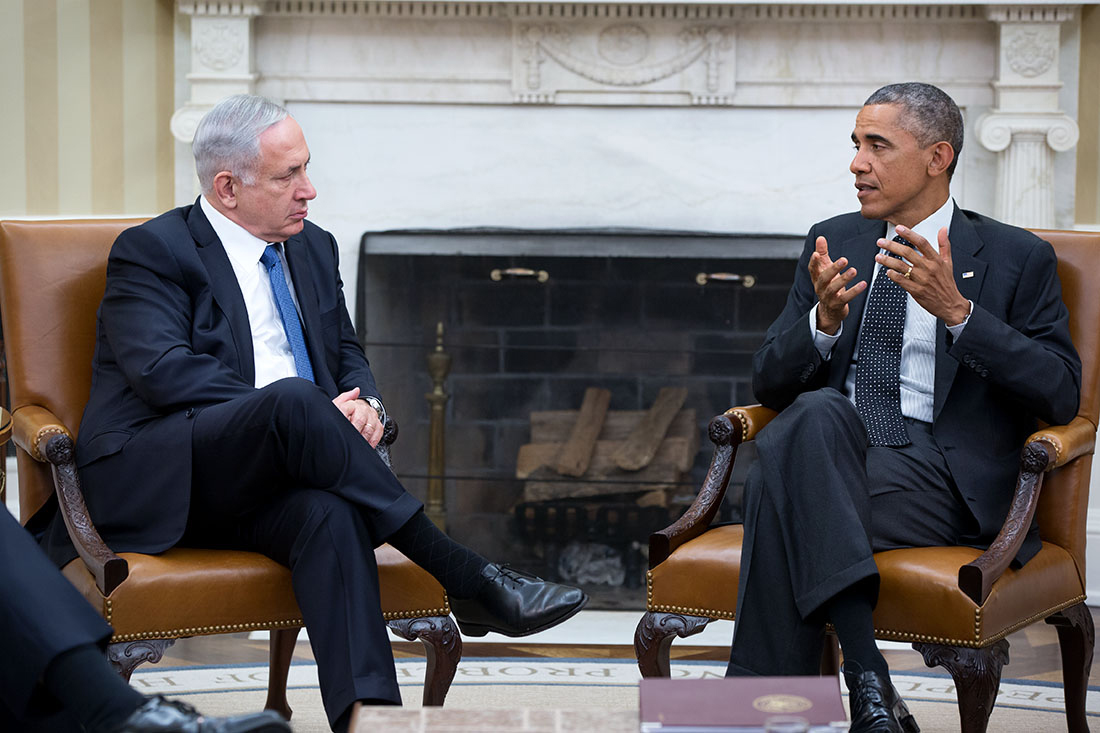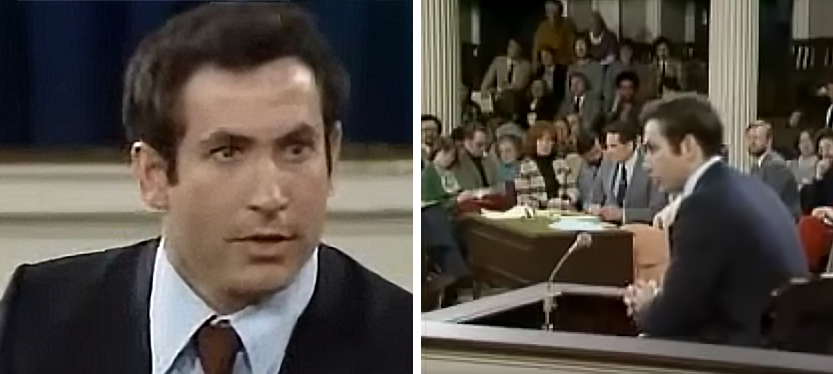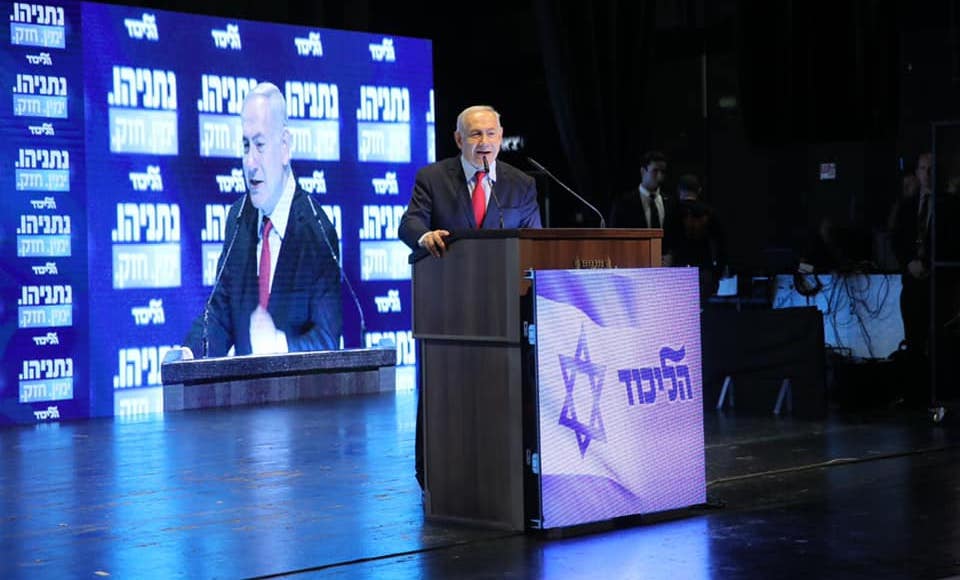- About Us
- Policy Center
- Learn
- Press Room
- Blog
- Get Involved
- Donate
- Donate to J Street Online
- Make a Gift in Someone’s Honor or Memory
- Make a Monthly Gift
- Tax-Deductible Donations
- Giving by mail
Ten years ago, at Bar Ilan University in Tel Aviv, Israeli Prime Minister Benjamin Netanyahu publicly indicated he would be willing to accept the two-state solution, a first for the right-wing leader.
Coming in the months after President Obama’s inauguration — and shortly after Obama’s landmark Cairo address in which he slammed the occupation as “intolerable” and described Palestinian aspirations for statehood as “legitimate” — Netanyahu’s remarks were seen as a major turning point.
“Mr. Netanyahu reversed his longstanding opposition to Palestinian statehood,” reported The New York Times at the time, “a move seen as a concession to American pressure.”

President Barack Obama holds a bilateral meeting with Prime Minister Benjamin Netanyahu of Israel in the Oval Office, Oct 1, 2014 (Official White House Photo by Pete Souza)
“I told President Obama in Washington,” Netanyahu said in the speech, “if we get a guarantee of demilitarization, and if the Palestinians recognize Israel as the Jewish state, we are ready to agree to a real peace agreement, a demilitarized Palestinian state side by side with the Jewish state.”
“I am willing to make painful compromises to achieve this historical peace,” Netanyahu later said in a speech to the United States Congress. “I recognize that in a genuine peace we will be required to give up parts of the ancestral Jewish homeland.”
“Netanyahu’s policies today remain essentially identical to those he held as a relative newcomer to politics.” – Anshel Pfeffer
But while the pro-peace movement welcomed Netanyahu’s endorsement of a two-state solution as a solid step forward at the time, on its ten year anniversary it’s worth examining whether Bar Ilan should be viewed as some kind of key pivot point and a lost opportunity, or merely a temporary shift in rhetoric form a leader whose views have been remarkably consistent.
“Netanyahu’s policies today remain essentially identical to those he held as a relative newcomer to politics,” wrote Netanyahu biographer Anshel Pfeffer in his 2018 book ‘Bibi’. “Few politicians have had such a long and intensive career without their views evolving. Over the years, Netanyahu has been forced to publicly jettison some positions and present a more pragmatic image. In his actions, he has remained resolutely doctrinaire.”
Before Bar Ilan
To trace Netanyahu’s evolution — or lack thereof — on the two-state solution, one can go as far back as 1978 when, at age 28, Netanyahu took to a public debate stage in Boston. In now familiar terms, Netanyahu positioned a Palestinian state and a Jewish state as mutually exclusive propositions, denying that Palestinians sought genuine self-determination and blurring distinctions between Palestinians, Jordanians and the broader Arab world.
“No I don’t think they do,” he said when asked whether the Palestinians had a right to statehood. “It is unjust to demand the creation of the 22nd Arab state and the second Palestinian state at the expense of the only Jewish state.”

A young Benjamin Netanyahu appears on 1978 TV show The Advocate and rejects Palestinian statehood (Vimeo / arabist)
In his 1993 book, “A Place Among the Nations”, Netanyahu blasted as naive those who suggested Israel will be treated fairly and equally if it ended the occupation. “These people believe all of Israel’s ills stem from the fateful days of June 1967,” he wrote.
In a 1993 New York Times op-ed, he outlined an “arrangement” in which “Israel controls the strategic area of the West Bank while the Arabs conduct their own affairs in such matters as health, education and commerce in their towns and villages.” Describing a “PLO state” as a “mortal threat” to Israel, he wrote that his vision “would give Israel security and Palestinians autonomy.”
In the year 2000, after his first term as Prime Minister, Netanyahu offered an update to his book which gives perhaps the most detailed insight into his vision for the region.
Rebranded “A Durable Peace”, Netanyahu’s book insists that vast swaths of the West Bank would need to remain in Israeli hands in any eventual agreement, a non-negotiable sticking point justified by defensive needs. Under the plan laid out in his book, Palestinians would be given limited autonomy in certain areas of the West Bank while Israel would retain complete control of the settlements, airspace and all entry and exit points. Netanyahu’s ‘solution’ would not allow for external refugees to return to the Palestinian controlled areas and ‘Palestine’ would be denied UN membership.
“[These arrangements] are not compatible with the idea of unlimited self-determination, which is what many normally associate with the concept of statehood,” Netanyahu writes. “That is why when I am asked whether I will support a Palestinian state, I answer in the negative.”
(Those arrangements, it should be said, which would deny full voting rights, civil rights and freedom of movement to millions of Palestinians, are also incompatible with democracy.)

The Israeli West-Bank barrier near Ramallah (Source: sendamessage.nl)
In 2001, in a conversation he was unaware was being recorded, Netanyahu squared his plan for the region with the apparent concessions he made to the Clinton administration while in office.
“America is a thing you can move very easily, move it in the right direction. They won’t get in the way,” he said, describing President Bill Clinton as “radically pro-Palestinian.” Rather than concessions, Netanyahu boasted that he “de facto put an end to the Oslo accords” through a loophole in his commitments.
“Nobody said what defined military zones were. Defined military zones are security zones. As far as I’m concerned, the entire Jordan Valley is a defined military zone. Go argue,” he said.
A year later in 2002, as Prime Minister Ariel Sharon began to move toward two-state solution terminology, Netanyahu tried to slam the brakes by calling, and winning, an internal party vote on the issue. “Self-rule for the Palestinians, yes. A state, no,” he told the Likud Central Committee. “A Palestinian state means no Jewish state, and a Jewish state means no Palestinian state.”
After Bar Ilan
With this strong, consistent record of opposition to a two-state solution, how does one explain Netanyahu’s 2009 declaration at Bar Ilan?
“There was nothing to suggest that beyond the words ‘Palestinian state,’ and self-rule in a cluster of enclaves, hemmed in by settlements and military bases, Netanyahu was prepared to give the Palestinians anything,” Pfeffer writes in ‘Bibi’. “It was the same plan as the one he had proposed on the eve of Oslo fifteen years ago, just with a different name.”
“You might think we’re going to dismantle the settlements, but you have to understand that our intention is just the opposite.” – Benjamin Netanyahu, 2009
It’s an interpretation which appears to find favor with Netanyahu himself, who — after describing his vision for limited autonomy and Israeli control — said in 2018: “It is what it is. You can give it any name you want: state-minus, autonomy-plus, autonomy plus-plus. We’re not going to imperil the life of the state, you know, for a label or a good op-ed.”
After Netanyahu’s Bar Ilan ‘concession’, there was little meaningful movement on a two-state solution. The Likud platform continued to oppose Palestinian statehood and, apart from a partial, temporary pause at the behest of the Obama administration, settlement construction continued unabated.
“You might think we’re going to dismantle the settlements, but you have to understand that our intention is just the opposite,” he said later in 2009.
After the US-led 2013-14 Israeli-Palestinian peace negotiations collapsed, US Special Envoy Indyk reportedly assigned blame primarily to Netanyahu based on his intractability on settlements.

In the last several election campaigns, Netanyahu has completely backtracked from any support for the two-state solution (Facebook / מפלגת הליכוד)
In 2015, in the midst of his reelection campaign, Netanyahu reverted back to his old rhetoric on Palestinian statehood. “If I’m elected there won’t be a Palestinian state,” he said in an interview with a Sheldon Adelson-backed website. “I think that anyone who moves to establish a Palestinian state and evacuate territory gives territory away to radical Islamist attacks against Israel.”
While the annexation pledge prompted condemnation from the international community, it’s a position consistent with the vision Netanyahu outlined more than two decades earlier.
In this year’s April election campaign, Netanyahu went further, tweeting that control over the West Bank was not only a security issue, but a matter of ancestral endowment. Later, he went further still, telling an interviewer he would annex settlements in the West Bank in his next term.
“I will impose sovereignty, but I will not distinguish between settlement blocs and isolated settlements,” he said. “From my perspective, any point of settlement is Israeli, and we have a responsibility, as the Israeli government. I will not uproot anyone, and I will not transfer sovereignty to the Palestinians.”
While the annexation pledge prompted condemnation from the international community, it’s a position consistent with the vision Netanyahu outlined more than two decades earlier.
Now, on the advent of its tenth anniversary, Netanyahu’s Bar Ilan speech feels as distant as ever. When viewed in context — and with ten years of hindsight — the Bar Ilan “concession” can perhaps now be more accurately described as merely a temporary “rebranding” of Netanyahu’s long-held political convictions.
Take action with J Street:
Despite being a clear violation of international law which would hamper future peace efforts, Netanyahu’s 2019 annexation pledge prompted no response from the Trump White House.
Indeed, in June 2019 America’s Ambassador to Israel, David Friedman, gave the green light to Netanyahu’s annexation pledge. “Under certain circumstances,” Mr. Friedman told the New York Times, “I think Israel has the right to retain some, but unlikely all, of the West Bank.”
From all indications, the imminent Kushner ‘peace’ plan appears likely to endorse Benjamin Netanyahu’s long-held vision for the region, one which would entrench the occupation, deny basic civil rights to millions of Palestinians and undermine Israel’s long-term security as a democratic Jewish homeland.
TELL THE SENATE TO TAKE A STAND AGAINST WEST BANK ANNEXATION | ADD YOUR NAME
Close